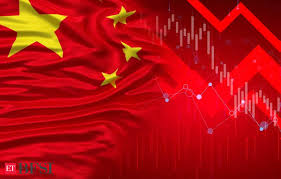
As China prepares to host a summit with 50 African nations in Beijing this week, the focus will be on the evolving economic relationship between the two regions. While China is keen to promote its goods, particularly electric vehicles (EVs) and solar panels, before Western export curbs take effect, African leaders will arrive with their own set of expectations, seeking clarity on unfulfilled promises and the future of Chinese investments.
During the three-yearly Forum on China-Africa Cooperation Summit, African leaders are likely to press China on its 2021 pledge to purchase $300 billion worth of goods from the continent, a promise that remains largely unmet. Additionally, they will demand updates on ongoing Chinese-funded infrastructure projects, such as the ambitious railway network intended to connect East Africa.
"The prize is going to go to those countries who have carefully studied the changes in China and align their proposals with China's new slimmed-down priorities," noted Eric Olander, co-founder of the China-Global South Project. However, he emphasized the challenge for African nations, many of which struggle with understanding China's evolving economic strategies.
China, once a dominant financier of large-scale infrastructure projects across Africa, is now pivoting towards selling advanced and green technologies. This shift comes as Beijing faces increasing pressure to find new markets for its EVs and solar panels, products that are central to its green energy ambitions but face potential overcapacity issues due to Western restrictions.
In preparation for the summit, China has already adjusted the terms of its loans to African nations, prioritizing investments in solar farms, EV manufacturing plants, and 5G infrastructure, while scaling back on traditional infrastructure projects like ports and railways. Data from Boston University's Global Development Policy Centre shows that in the past year, China extended 13 loans worth $4.2 billion to eight African states and two regional banks, with a significant portion allocated to green energy initiatives.
When President Xi Jinping opens the summit, he is expected to advocate for stronger integration between Africa and China's burgeoning green energy sector, particularly in nations like Gambia, Kenya, Nigeria, South Africa, and Zimbabwe. However, with China’s rivals such as the United States and European nations also courting African leaders, Beijing's dominance as Africa's top financial and trade partner is being increasingly challenged.
Despite China's continued prominence, there is growing scrutiny from African leaders regarding the balance of benefits in their partnerships with Beijing. Hannah Ryder, founder of Development Reimagined, an African-owned consultancy, questioned whether African leaders could leverage the summit to secure more favorable terms from China, particularly in light of China's cautious approach to financing large projects amidst ongoing debt restructuring in several African nations.
Moreover, security concerns, such as the recent conflict between Niger and Benin that resulted in the deaths of six Nigerien soldiers guarding a Chinese-backed pipeline, or protests in Kenya over tax hikes, could further temper China's willingness to make new financial commitments.
As the summit unfolds, all eyes will be on the outcomes, with African leaders seeking not just promises, but tangible actions that will address their economic needs and advance their development goals.
(Source:www.theprint.in)
During the three-yearly Forum on China-Africa Cooperation Summit, African leaders are likely to press China on its 2021 pledge to purchase $300 billion worth of goods from the continent, a promise that remains largely unmet. Additionally, they will demand updates on ongoing Chinese-funded infrastructure projects, such as the ambitious railway network intended to connect East Africa.
"The prize is going to go to those countries who have carefully studied the changes in China and align their proposals with China's new slimmed-down priorities," noted Eric Olander, co-founder of the China-Global South Project. However, he emphasized the challenge for African nations, many of which struggle with understanding China's evolving economic strategies.
China, once a dominant financier of large-scale infrastructure projects across Africa, is now pivoting towards selling advanced and green technologies. This shift comes as Beijing faces increasing pressure to find new markets for its EVs and solar panels, products that are central to its green energy ambitions but face potential overcapacity issues due to Western restrictions.
In preparation for the summit, China has already adjusted the terms of its loans to African nations, prioritizing investments in solar farms, EV manufacturing plants, and 5G infrastructure, while scaling back on traditional infrastructure projects like ports and railways. Data from Boston University's Global Development Policy Centre shows that in the past year, China extended 13 loans worth $4.2 billion to eight African states and two regional banks, with a significant portion allocated to green energy initiatives.
When President Xi Jinping opens the summit, he is expected to advocate for stronger integration between Africa and China's burgeoning green energy sector, particularly in nations like Gambia, Kenya, Nigeria, South Africa, and Zimbabwe. However, with China’s rivals such as the United States and European nations also courting African leaders, Beijing's dominance as Africa's top financial and trade partner is being increasingly challenged.
Despite China's continued prominence, there is growing scrutiny from African leaders regarding the balance of benefits in their partnerships with Beijing. Hannah Ryder, founder of Development Reimagined, an African-owned consultancy, questioned whether African leaders could leverage the summit to secure more favorable terms from China, particularly in light of China's cautious approach to financing large projects amidst ongoing debt restructuring in several African nations.
Moreover, security concerns, such as the recent conflict between Niger and Benin that resulted in the deaths of six Nigerien soldiers guarding a Chinese-backed pipeline, or protests in Kenya over tax hikes, could further temper China's willingness to make new financial commitments.
As the summit unfolds, all eyes will be on the outcomes, with African leaders seeking not just promises, but tangible actions that will address their economic needs and advance their development goals.
(Source:www.theprint.in)





